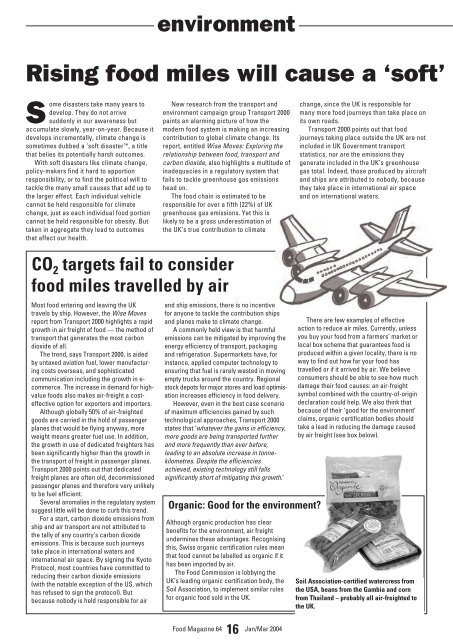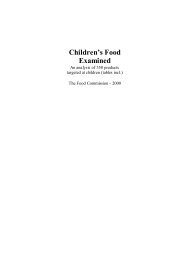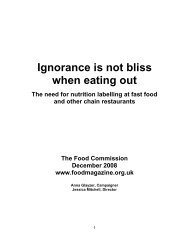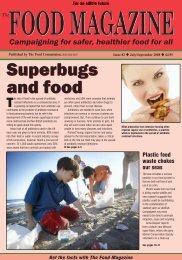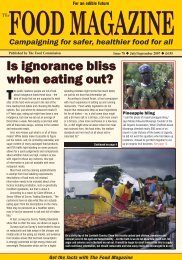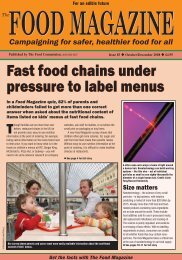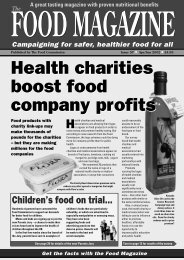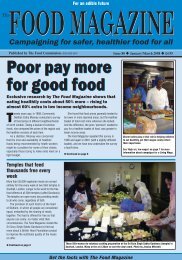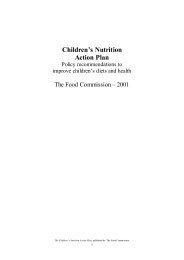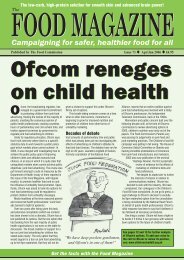Soft drinks - The Food Commission
Soft drinks - The Food Commission
Soft drinks - The Food Commission
- No tags were found...
You also want an ePaper? Increase the reach of your titles
YUMPU automatically turns print PDFs into web optimized ePapers that Google loves.
environmentRising food miles will cause a ‘soft’Some disasters take many years todevelop. <strong>The</strong>y do not arrivesuddenly in our awareness butaccumulate slowly, year-on-year. Because itdevelops incrementally, climate change issometimes dubbed a ‘soft disaster’*, a titlethat belies its potentially harsh outcomes.With soft disasters like climate change,policy-makers find it hard to apportionresponsibility, or to find the political will totackle the many small causes that add up tothe larger effect. Each individual vehiclecannot be held responsible for climatechange, just as each individual food portioncannot be held responsible for obesity. Buttaken in aggregate they lead to outcomesthat affect our health.New research from the transport andenvironment campaign group Transport 2000paints an alarming picture of how themodern food system is making an increasingcontribution to global climate change. Itsreport, entitled Wise Moves: Exploring therelationship between food, transport andcarbon dioxide, also highlights a multitude ofinadequacies in a regulatory system thatfails to tackle greenhouse gas emissionshead on.<strong>The</strong> food chain is estimated to beresponsible for over a fifth (22%) of UKgreenhouse gas emissions. Yet this islikely to be a gross underestimation ofthe UK’s true contribution to climatechange, since the UK is responsible formany more food journeys than take place onits own roads.Transport 2000 points out that foodjourneys taking place outside the UK are notincluded in UK Government transportstatistics, nor are the emissions theygenerate included in the UK’s greenhousegas total. Indeed, those produced by aircraftand ships are attributed to nobody, becausethey take place in international air spaceand on international waters.CO 2 targets fail to considerfood miles travelled by airMost food entering and leaving the UKtravels by ship. However, the Wise Movesreport from Transport 2000 highlights a rapidgrowth in air freight of food — the method oftransport that generates the most carbondioxide of all.<strong>The</strong> trend, says Transport 2000, is aidedby untaxed aviation fuel, lower manufacturingcosts overseas, and sophisticatedcommunication including the growth in e-commerce. <strong>The</strong> increase in demand for highvaluefoods also makes air-freight a costeffectiveoption for exporters and importers.Although globally 50% of air-freightedgoods are carried in the hold of passengerplanes that would be flying anyway, moreweight means greater fuel use. In addition,the growth in use of dedicated freighters hasbeen significantly higher than the growth inthe transport of freight in passenger planes.Transport 2000 points out that dedicatedfreight planes are often old, decommissionedpassenger planes and therefore very unlikelyto be fuel efficient.Several anomalies in the regulatory systemsuggest little will be done to curb this trend.For a start, carbon dioxide emissions fromship and air transport are not attributed tothe tally of any country’s carbon dioxideemissions. This is because such journeystake place in international waters andinternational air space. By signing the KyotoProtocol, most countries have committed toreducing their carbon dioxide emissions(with the notable exception of the US, whichhas refused to sign the protocol). Butbecause nobody is held responsible for airand ship emissions, there is no incentivefor anyone to tackle the contribution shipsand planes make to climate change.A commonly held view is that harmfulemissions can be mitigated by improving theenergy efficiency of transport, packagingand refrigeration. Supermarkets have, forinstance, applied computer technology toensuring that fuel is rarely wasted in movingempty trucks around the country. Regionalstock depots for major stores and load optimisationincreases efficiency in food delivery.However, even in the best case scenarioof maximum efficiencies gained by suchtechnological approaches, Transport 2000states that ‘whatever the gains in efficiency,more goods are being transported furtherand more frequently than ever before,leading to an absolute increase in tonnekilometres.Despite the efficienciesachieved, existing technology still fallssignificantly short of mitigating this growth.’Organic: Good for the environment?Although organic production has clearbenefits for the environment, air freightundermines these advantages. Recognisingthis, Swiss organic certification rules meanthat food cannot be labelled as organic if ithas been imported by air.<strong>The</strong> <strong>Food</strong> <strong>Commission</strong> is lobbying theUK’s leading organic certification body, theSoil Association, to implement similar rulesfor organic food sold in the UK.<strong>The</strong>re are few examples of effectiveaction to reduce air miles. Currently, unlessyou buy your food from a farmers’ market orlocal box scheme that guarantees food isproduced within a given locality, there is noway to find out how far your food hastravelled or if it arrived by air. We believeconsumers should be able to see how muchdamage their food causes: an air-freightsymbol combined with the country-of-origindeclaration could help. We also think thatbecause of their ‘good for the environment’claims, organic certification bodies shouldtake a lead in reducing the damage causedby air freight (see box below).Soil Association-certified watercress fromthe USA, beans from the Gambia and cornfrom Thailand – probably all air-freighted tothe UK.<strong>Food</strong> Magazine 64 16 Jan/Mar 2004


